Did you know that unprotected garage floors can absorb up to 2 gallons of oil and chemicals per year, leading to costly repairs and messy cleanups? Investing in garage floor coating benefits isn't just about looks—it’s about lasting performance, real savings, and a transformation you can actually feel every day. Whether you’re tired of unsightly stains, battling cracks, or just want to boost your home's value, exploring the world of epoxy floor and other modern garage floor coating options is a step you won’t regret.
Unveiling the Garage Floor Coating Benefits: Why Your Garage Needs an Upgrade
The garage floor coating benefits go far beyond mere aesthetics. Homeowners often underestimate how much wear and tear their garage floor endures—from vehicles and tools to dropped equipment and chemical spills. Left unprotected, a concrete floor is prone to stains, cracks, and a gradual decline that can slash your garage’s utility and your property’s value. But with advanced options like epoxy flooring, polyaspartic, or acrylic floor coatings, you gain year-round protection, easy cleanup, and a sleek finish that truly elevates your space.
Today’s garage floor coatings offer durability and long-lasting benefits that make them a smart investment. They resist chemical spills, withstand heavy vehicles, and stay looking sharp with minimal maintenance. This means fewer repairs, fewer replacement costs, and a garage you’re actually proud to show off. Whether your main concern is keeping your garage easy to clean, preventing slippery accidents, or just wanting that high-end showroom shine, the right coating can do it all.
Opening Hook: Surprising Facts About Garage Floor Coating Benefits
Here’s something most people don’t know: A professionally installed epoxy garage floor can endure up to 20 years of heavy use, outlasting standard concrete by a decade or more! Plus, many modern coatings offer UV resistance and are available in dozens of styles and custom colors. If you thought a garage floor is just a slab of concrete, think again—a premium floor coating gives you a functional, beautiful, and valuable upgrade you can’t afford to ignore.
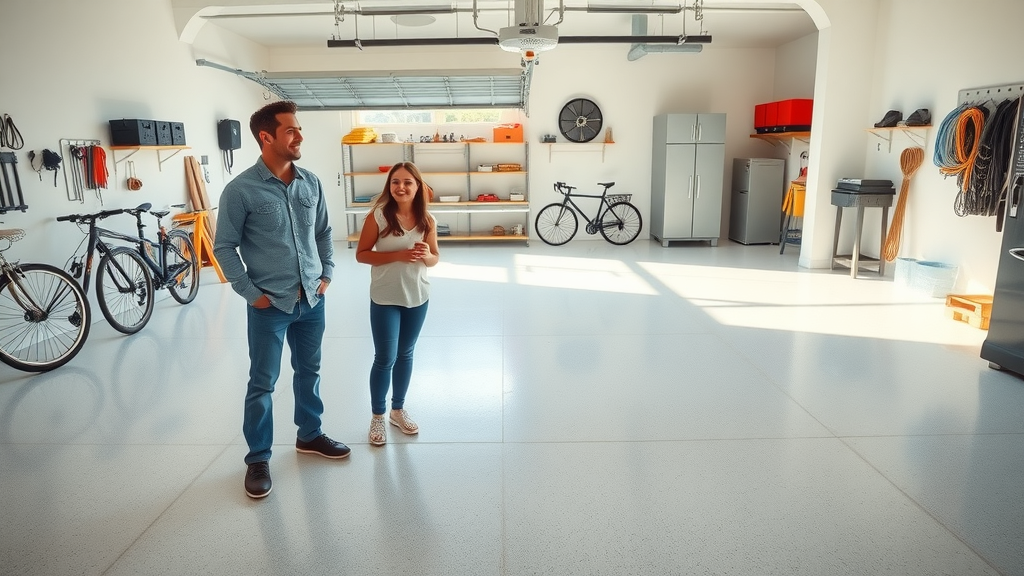
What You'll Learn About Garage Floor Coating Benefits
Key reasons why epoxy floor coatings are vital for garages
Cost and longevity data for top garage floor coatings
Common myths and facts about floor coatings
Real homeowner testimonials on epoxy flooring
1. Enhanced Durability: Garage Floor Coating Benefits for Long-Term Use
One of the main reasons homeowners opt for garage floor coating benefits is unmatched durability. When compared to standard concrete floors, coatings such as epoxy flooring or polyaspartic systems offer a tough, resilient surface designed to withstand years of heavy equipment, tire marks, dropped tools, and foot traffic. Epoxy floor coatings bond with the concrete substrate, making a seamless surface that resists scratches, gouges, and even cracking. This means you can use your garage for anything—from woodworking projects to weightlifting—with total peace of mind.
Long-term protection also means fewer surprises down the road. Unlike plain concrete, which often absorbs oil, antifreeze, and moisture, an epoxy floor acts as a powerful barrier, keeping harmful substances from reaching the underlying structure. Over time, this translates into fewer costly repairs and a floor that remains structurally sound. When surveyed, homeowners with installed epoxy floors often remark on the coating’s ability to withstand abuse without showing signs of wear. That’s durability that pays off year after year.
Epoxy Floor Durability: Protection Against Stains and Cracks
Stains and cracks are the twin enemies of any garage floor. Epoxy coatings deliver outstanding protection by sealing the concrete floor beneath a hard, non-porous surface. That means oil, paint, battery acid, and other tough stains simply wipe away, leaving no residue behind. This barrier also prevents moisture from seeping in, which is a leading cause of cracking and freeze-thaw damage in colder climates.
Modern epoxy floor coatings are engineered with industrial-grade resins that not only adhere tightly but also flex slightly with temperature shifts, further reducing the risk of cracks. The result? A robust floor that stays strong and stain-free—no matter how hard you use your garage. For homeowners, this means preserving their investment and eliminating hours of tedious cleaning or expensive restoration. It’s no wonder that garage floor epoxy is a top choice for longevity and protection.
2. Improved Appearance: Transform Your Garage Floor
Let’s face it: a plain, stained concrete garage isn’t exactly inspiring. One of the most tangible garage floor coating benefits is the transformation in appearance. With a professional floor coating system, you can turn dull concrete into a glossy, colorful, and highly reflective surface. From subtle solid colors to vibrant blends and metallic or flake finishes, modern epoxy flooring options offer something for everyone. These coatings are designed to stay bright, resist yellowing, and maintain their luster for years to come—even in homes with plenty of natural sunlight streaming in.
A visually appealing garage space goes well beyond bragging rights. An upgraded garage often becomes a multi-purpose room—ideal for home gyms, workshops, or simply a cleaner, brighter entryway. Enhanced lighting from glossy surfaces can make your garage feel larger, more open, and safer, all while keeping dust and grime at bay. When you choose a garage floor coating, you’re choosing an upgrade that’s immediately noticeable and endlessly practical.
Garage Flooring Options for a Visual Makeover
When it’s time for a garage makeover, few upgrades match the impact of a new floor coating. Traditional flooring options, like plain concrete, quickly show wear, dust, and stains. In contrast, epoxy garage flooring comes in a spectrum of hues and patterns, including classic grays, vibrant blues, or dramatic metallic finishes. Flake additives can introduce subtle sparkle, camouflage imperfections, or add distinctive style.
Homeowners now have access to dozens of custom options—everything from stone-like textures to bold color blocks—making the garage an extension of your home’s personality. Polyaspartic and acrylic coatings supply even more choice in finish, drying times, and UV resistance. Whether you want a sleek showroom look or a rugged shop floor, today’s garage floor coatings deliver aesthetics you’ll enjoy every day.
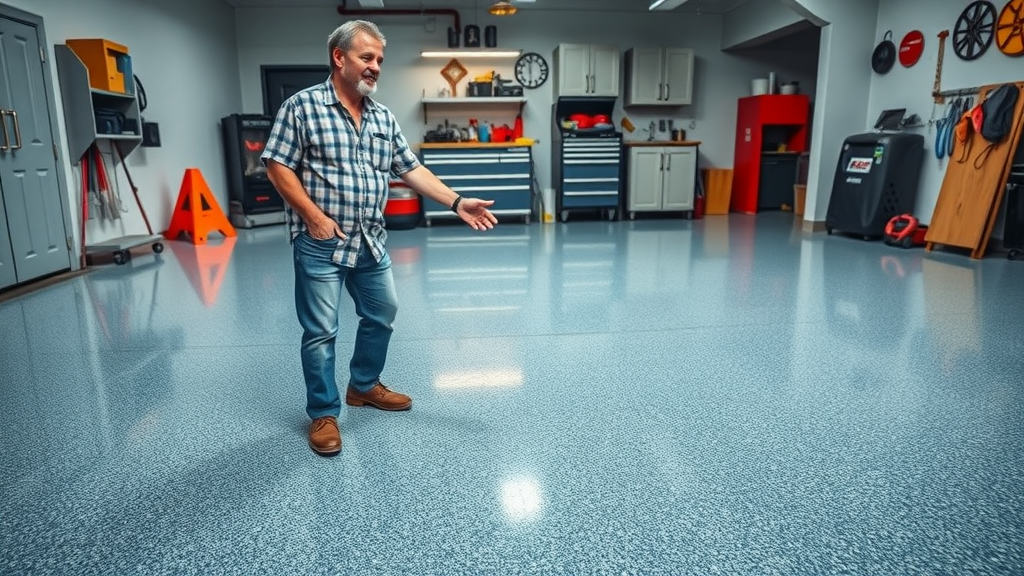
3. Low Maintenance: Garage Floor Coating Benefits for Easy Cleaning
High-maintenance garage floors are a thing of the past thanks to modern garage floor coatings. One of the most celebrated benefits of epoxy flooring and similar systems is how easy to clean and maintain they are. Unlike uncoated concrete, which can trap dirt and stains, a sealed floor requires minimal upkeep: a soft broom, damp mop, or even just a blast from a hose is often all you need to restore shine.
Garage floor coatings resist dust and help prevent allergens from clinging to surfaces, keeping your garage space cleaner and more inviting for everything from car care to kids’ projects. The sealed, seamless surface also eliminates the cracks and porous spots that harbor debris. With low effort and consistent results, garage floor coating benefits make everyday cleaning a breeze.
Epoxy Flooring: Simple Upkeep, Lasting Results
Routine care for an epoxy floor couldn’t be easier. Most spills—including oil, gasoline, or household chemicals—rest on the surface until wiped up. There's no need for harsh chemicals or scrubbing, saving homeowners time and money. If you’re tired of wrestling with ground-in stains or hours of scrubbing, you’ll love the easy maintenance of professionally installed garage floor coatings.
These coatings also keep dust, pollen, and dirt from floating around, which reduces cleaning needs for both the garage and your home. Many users report their garage stays fresher and retains a just-installed look, even with daily wear and tear. All in all, investing in garage floor coating benefits means you spend less time cleaning—and more time enjoying your revamped garage space.
4. Resistance to Chemicals and Spills: The Science Behind Epoxy Floor Coatings
A garage is ground zero for chemical and fluid spills, so one of the standout garage floor coating benefits is superior chemical resistance. Epoxy floors and similar coatings are formulated to withstand everything from oil and brake fluid to household cleaners and battery acid. The non-porous surface prevents absorption, so dangerous chemical spills simply bead up on the surface, making cleanup safe and simple without risking long-term damage or hazardous residues.
Whether you use your garage for vehicle maintenance, crafts, or heavy-duty hobbies, investing in a professional coating system is essential for protecting both your floor and those who use the space. This barrier keeps the underlying concrete surface intact and safe from erosion or corrosion caused by repeated chemical spill exposure.
How Floor Coating Shields Against Automotive Fluids
Automotive fluids—motor oil, coolant, grease—are among the greatest threats to any garage floor. A professionally installed epoxy coating system provides an impermeable barrier that repels these fluids, stopping them from seeping in and causing stains or surface deterioration.
The science lies in the tightly bonded layers of epoxy resin, which resist not just water but a vast range of automotive and industrial chemicals. Unlike DIY paints or sealers, these professional coatings have undergone extensive lab testing for chemical resilience, ensuring optimal protection for years. For car enthusiasts and everyday drivers alike, this benefit keeps garage floors looking sharp and functioning safely, even when accidents happen.
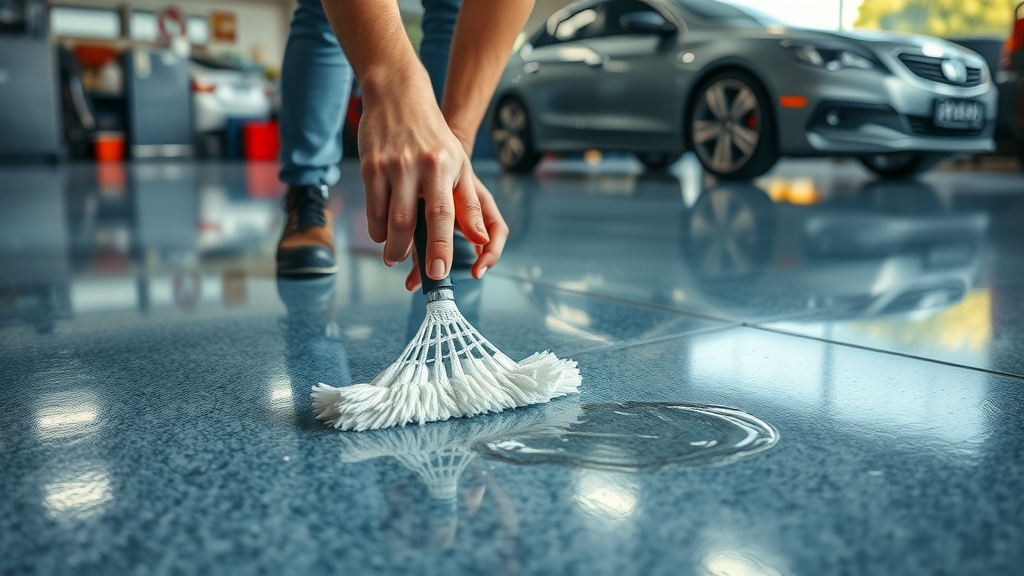
5. Increased Home Value: Do Garage Floor Coating Benefits Pay Off?
Installing a premium garage floor coating isn’t just a cosmetic boost—it’s a smart investment that can directly impact your property’s value. A well-maintained, durable, and visually striking garage floor serves as a powerful selling point when listing your home. Prospective buyers love spaces that are move-in ready, easy to clean, and built to last. In today’s competitive real estate market, a pristine garage with a professionally installed epoxy floor can set your home apart.
Appraisers and home inspectors often note the superior state of a finished garage as a sign of all-around property care. Plus, investing in garage floor coating benefits usually costs far less than extensive repairs or replacements in the future. This means you get both immediate enjoyment and long-term equity gains, making this upgrade one of the most cost-effective in home improvement.
The Market Impact of Professionally Installed Epoxy Floors
Studies show that homes with upgraded garages, particularly those featuring a professionally installed epoxy floor, fetch higher prices and spend less time on the market. Buyers recognize the added protection against stains, cracks, and spills, understanding that less maintenance is needed over the years. Professionally finished garages often transform the perception of the space, turning it from a storage afterthought into a highly functional living or hobby area.
Even small investments in high-value coatings can yield returns exceeding the cost of the project. By protecting the garage floor and boosting curb appeal, a new coating can turn your “fixer-upper” garage into a significant asset and market differentiator at selling time.
6. Safety Improvements: Garage Floor Coating Benefits for Households
Safety is non-negotiable, and today's garage floor coating benefits directly address risks like slips and falls. High-quality floor coatings can be installed with textured additives or slip-resistant finishes, dramatically reducing the chance of accidents—especially in high-traffic areas or in households with children and seniors. Unlike untreated concrete, which can be dangerously slippery when wet, epoxy or polyaspartic coatings provide steady footing year-round.
For busy households or those who use their garages for workshops or fitness, this slip resistance adds year-round peace of mind. The sealed, seamless floor is also less likely to hold puddles from melted snow, water, or garage mishaps, keeping both your family and visitors safe.
Slip Resistance with Quality Floor Coatings
Not all garage floor coatings are created equal when it comes to slip resistance. Professional installers can mix fine-grit materials into the top layer, boosting traction underfoot without sacrificing the sleek appearance of the floor. This means even if water or oil is spilled, your risk of slips and falls is reduced—a critical factor for any household.
These features make garage epoxy floors ideal for anyone looking for a safe, dependable workspace or family zone. The right coating application ensures safety without compromising function or aesthetics, making it a win-win investment for every garage owner.
7. Moisture and Stain Resistance: Keeping Garage Floors Dry
Moisture is a hidden enemy for most garage floors. Without protection, water from car tires, inclement weather, or routine cleaning can seep into the concrete surface, leading to mold, mildew, and freeze-thaw damage. Garage floor coating benefits start with effective moisture and stain resistance, helping keep your floor dry and avoiding structural weakening over time.
Stain resistance is equally important; with a professional epoxy or polyaspartic system, you’ll never have to worry about unsightly oil, paint, or chemical marks setting in. This means your garage remains both dry and spotless—no matter how challenging the conditions.
Epoxy Coating as a Moisture Vapor Barrier
Epoxy coatings act as a powerful vapor barrier, sealing out water and moisture before it has a chance to penetrate the concrete. This not only protects the structural integrity of your garage floor but also prevents the growth of mold and mildew, keeping the air cleaner and the space safer for everyone.
For homes in humid climates or areas prone to rain and snow, the ability of epoxy flooring to form a water-resistant shield is invaluable. By keeping both liquid spills and airborne moisture at bay, your garage remains a usable, pleasant environment year-round.
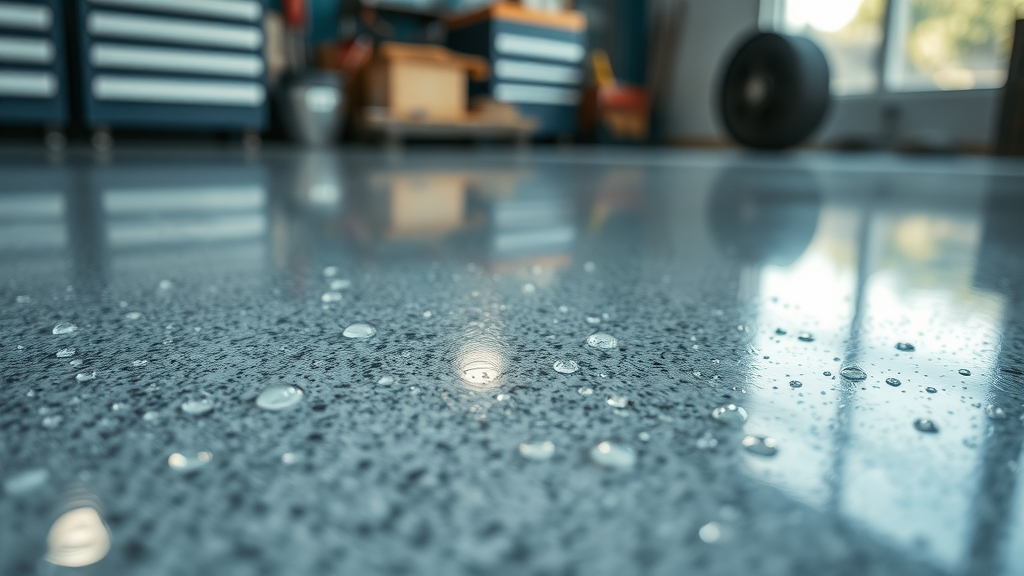
8. Cost-Effective Upgrades: Are Garage Floor Coating Benefits Worth the Investment?
When weighing garage floor coating benefits, cost-effectiveness stands out as a major draw. Many homeowners discover that a professional coating application, while an upfront investment, curbs long-term expenses by eliminating the need for frequent repairs, patching, or full floor replacements.
Comparing the life span, maintenance needs, and resiliency of different flooring options—like epoxy, polyaspartic, and acrylic—makes clear that the right choice can save you significant money and hassle over the years. The chart below breaks down average costs and expected longevity for each type, helping you choose what’s best for your needs and budget.
Comparing Floor Coating Costs Versus Repairs and Replacements
Coating Type |
Avg. Cost (per sq. ft.) |
Lifespan |
Maintenance Needs |
|---|---|---|---|
Epoxy Floor |
$3–$10 |
10–20 years |
Low |
Polyaspartic |
$5–$12 |
7–15 years |
Low |
Acrylic |
$2–$5 |
3–7 years |
Moderate |
While acrylic coatings provide an affordable entry point, they require more frequent upkeep. Polyaspartic coatings offer excellent performance and fast installation at a slightly higher price, while epoxy strikes an ideal balance for long-term value. Factoring labor, prep, and durability, the savings add up quickly compared to unprotected concrete—which often needs patching, sealing, or even a complete redo after a few years of heavy use.
9. Quick Installation and Minimal Downtime
No one wants their garage out of service for weeks. Another practical benefit of today’s garage floor coatings is fast installation—with most professionally installed epoxy floors ready for light use in just 24–48 hours. Modern systems cure quickly thanks to improved chemistry, meaning downtime is minimized and you can get back to working, storing, or parking in your garage ASAP.
Professional installers handle all surface preparation, including cleaning, repairing, and priming the concrete, ensuring the most durable bond possible. This level of prep work and expertise guarantees a long-lasting result and a seamless experience from start to finish.
Professionally Installed Epoxy Garage Floor Timelines
A typical timeline for epoxy garage floor installation is surprisingly brief: surface prep takes one day, coating application takes another, and after 24–48 hours’ cure time, your garage is ready for use. Polyaspartic coatings can be installed even faster, often returning full functionality in less than a day. This quick turnaround is a major win for busy families who rely on their garage space for multiple uses.
DIY solutions may offer cost savings but tend to extend downtime significantly—and the results usually lack the smooth, durable finish of a professional job. If you need a fast transformation with guaranteed durability, professional installation is the smart way to unlock all the garage floor coating benefits.
10. Customizability: Garage Floor Coating Benefits for Unique Spaces
Your garage floor doesn’t need to be “one size fits all.” Modern garage floor coating options are fully customizable, allowing you to personalize colors, patterns, and even texture to suit your needs. Choose from bold hues, subtle earth tones, flecked finishes, or glossy metallics. Some systems even let you embed logos or graphics right into the floor!
This flexibility means you can design a garage that matches your lifestyle, whether you crave the look of a luxury car showroom, a rugged workshop, or a playful family space. Custom textures can increase slip resistance, while unique color blends add visual punch. No matter your taste, garage floor coating benefits include total creative control.
Personalize Your Epoxy Floor With Colors and Textures
Epoxy floors stand out as the ultimate choice for personalization. You can combine color chips, glitter, matte, or gloss finishes to reflect your unique style. Even high-traffic workshops can have tailored flooring with durable finishes that mask wear while still looking great.
Installers offer numerous design templates or allow you to create your own from scratch, making the upgrade as practical as it is personal. With so many possible combinations, your garage becomes another canvas—making it a space you’ll love to show off to family, friends, and visitors.
Expert Insight: Quotes on Garage Floor Coating Benefits
“An epoxy floor not only enhances garage longevity, but also turns a functional space into a true asset.” — Local Home Improvement Specialist
People Also Ask About Garage Floor Coating Benefits
Is it worth coating your garage floor?
Absolutely. The garage floor coating benefits extend beyond aesthetics to include protection from stains, easy cleaning, improved safety, and increased home value. For most homeowners, the investment in a durable epoxy, polyaspartic, or acrylic coating pays itself off over the years with lower maintenance costs and fewer repairs. And thanks to modern installation methods, you can achieve a long-lasting, professional result with minimal downtime.
What is the average cost to have a garage floor coated?
Professional garage floor coating costs range from $3–$12 per square foot, depending on the product type, local labor rates, and prep requirements. Epoxy floor coatings average between $3–$10, while high-performance polyaspartic options may reach $12 for top-tier finishes. Consult a local installer for a tailored quote based on your garage size and desired finish.
How long does a garage floor coating last?
A quality epoxy garage floor coating can last 10–20 years or more with proper care. Polyaspartic coatings last 7–15 years, while acrylics wear out after 3–7 years on average. Factors like surface preparation, usage, and routine maintenance play major roles in maximizing lifespan. Investing in professional installation ensures the longest possible durability for your floor.
What are the downsides of epoxy garage floors?
The most common downside to epoxy floors is the required surface prep—concrete must be thoroughly cleaned and repaired before coating or the bond may fail. DIY applications sometimes result in peeling or uneven finishes. Epoxy floors may also become slippery when wet (unless grit additives are used) and can yellow in prolonged direct sunlight. Choosing a professional installer and opting for high-grade products effectively minimizes these concerns.
FAQs: Garage Floor Coating Benefits
How do I clean my epoxy floor?
Simply sweep or vacuum regularly and mop with mild soap and water. For tougher spots, use a gentle scrub pad—no harsh chemicals required.Can I DIY a garage floor coating?
DIY kits exist, but surface preparation is critical and errors can be hard to fix. For best results and longevity, consider professional installation.Is it safe to park vehicles immediately after installation?
No. Wait 24–72 hours (depending on product) before parking to ensure a fully cured, durable coating.What is the difference between polyaspartic and epoxy coatings?
Polyaspartic coatings cure faster and offer superior UV resistance, while epoxies deliver long-term durability and greater design flexibility. Both provide top-level protection when installed properly.
Key Takeaways: Why Garage Floor Coating Benefits Matter
Garage floor coating boosts both aesthetics and durability.
Epoxy and polyaspartic offer top-tier protection for garage floors.
Professional installation ensures optimal performance and ROI.
Conclusion: Maximizing Garage Floor Coating Benefits
Protect your investment and transform your garage with a professional floor coating—it’s a decision that rewards you with beauty, safety, and long-term value.
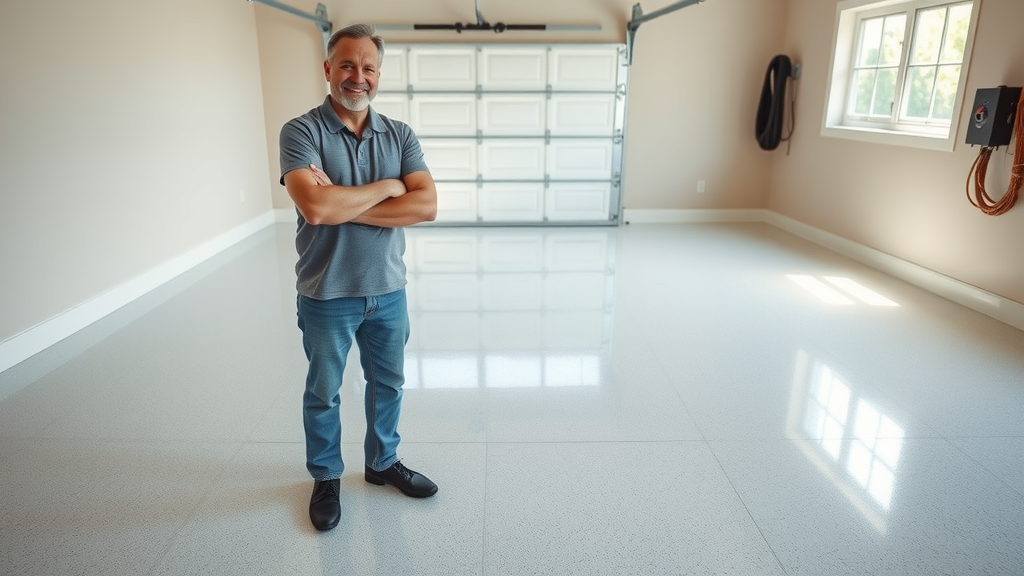
Ready to Unlock All the Garage Floor Coating Benefits?
Call us now to get your free quote!! Start enjoying a better, brighter, and more valuable garage today with the power of professional garage floor coatings.
Enhancing your garage with a durable floor coating offers numerous advantages. The article “7 Greatest Benefits of Floor Coating for Garage Spaces You Can’t Miss Out On” from Select Coatings highlights key benefits such as protection from cracks and stains, improved durability, and enhanced aesthetics. (select-kc.com) Similarly, “The Advantages of Garage Floor Coatings” by Go Orange Rhino emphasizes resistance to chemicals and stains, easy maintenance, and increased resale value. (goorangerhino.com) If you’re serious about upgrading your garage, these resources will provide valuable insights into the benefits and options available.
 Add Row
Add Row  Add
Add 

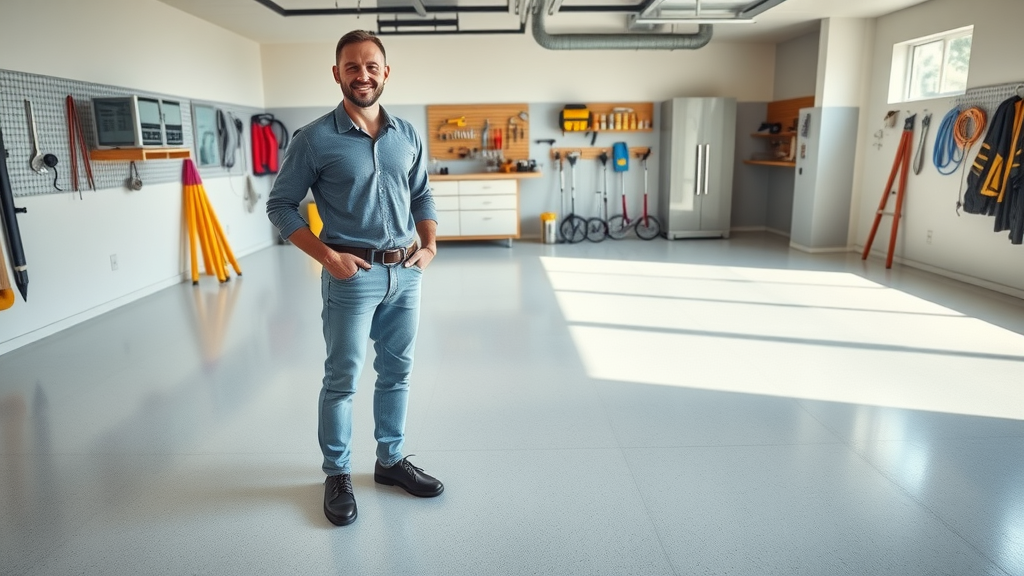
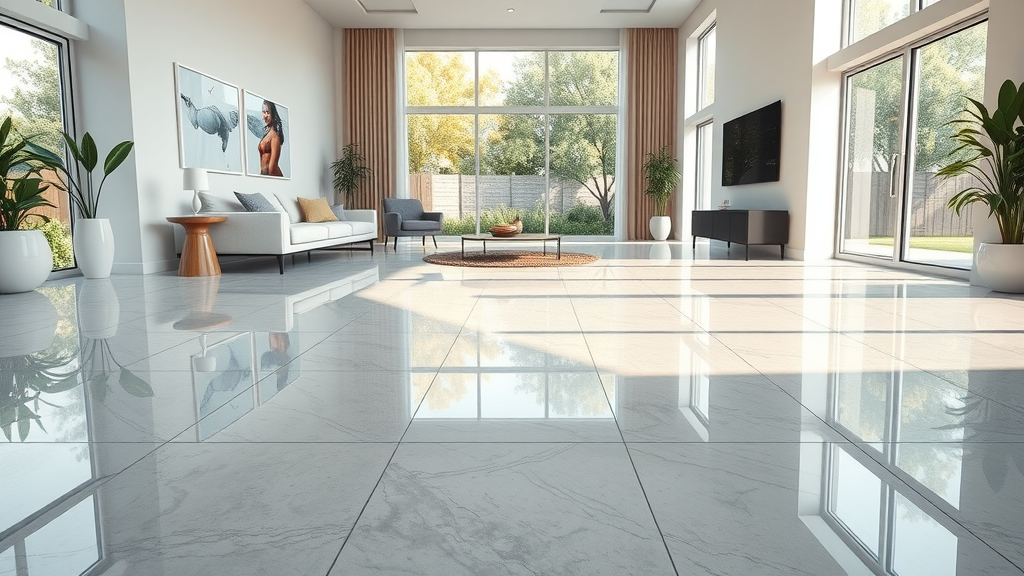
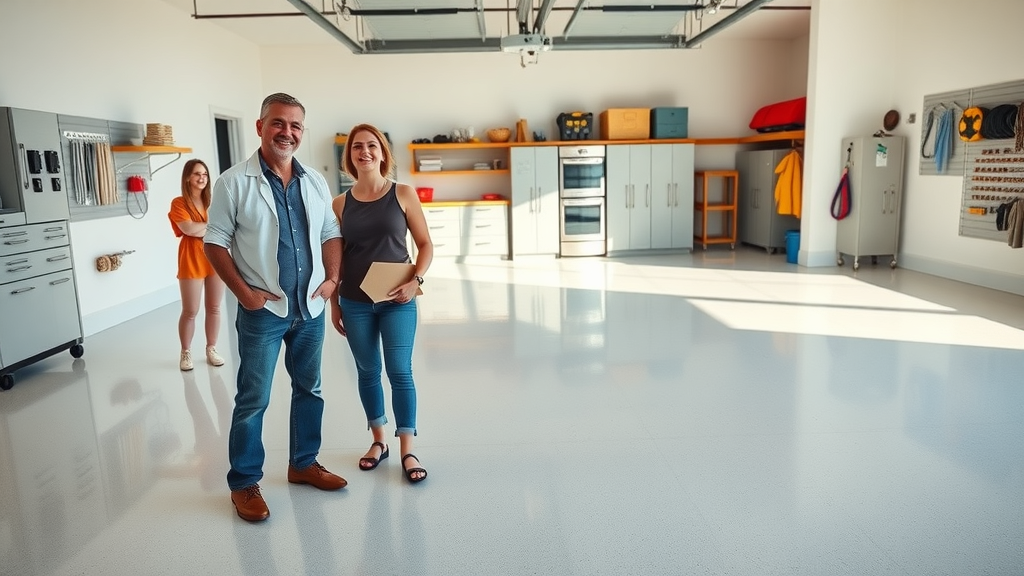
Write A Comment